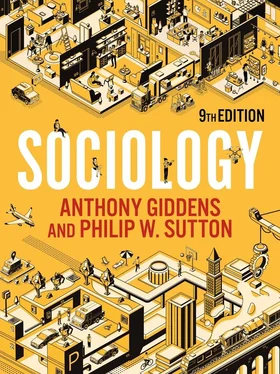Chapter 21, ‘Nations, War and Terrorism’ – colonialism and postcolonial identities, globalization and the erosion of national identities, human rights in a global context, global terror networks, ‘new wars’ under globalization
Chapter 22, ‘Crime and Deviance’ – organized global crime, online ‘cybercrime’
Our second theme is social inequality, a founding issue of sociology from its origins in the nineteenth century. Can this really still be a key theme today? The simple answer is, yes. Inequality, both within a single society and between diff erent societies, is just as significant today as it was in the past, and in some ways even more so. Despite the fabulous productive capacity and wealth that exist today, the distribution of rewards remains grossly unequal. Some recent research finds that, globally, the world’s wealth has accumulated disproportionately in the hands of a tiny proportion of the global population. Chapter 6, ‘Global Inequality’, deals with this issue most directly, though numerous others also cover the issue. Economic inequality is just one form of inequality recognized by sociologists today. Race and ethnicity, gender, sexuality, disability and age-related inequality are all discussed at various points in the book. Many studies today have found that apparently discrete forms of inequality are, in fact, interrelated, producing a diverse set of individual life experiences. Sociologists now routinely look to explore the ways in which these major social inequalities ‘intersect’.
Social inequality in the ninth edition
The issue of social inequality has been and remains so fundamental to sociological studies that it may legitimately be said to infuse all of its specialist fields. For this book, that means every chapter contains some discussion of inequalities. However, some of these are more systematic and focused than others, and these sections are listed below:
Chapter 1, ‘What is Sociology?’ – Karl Marx on class-based inequality, conflict theory in sociology and an introduction to feminist theories of gender inequality
Chapter 3, ‘Theories and Perspectives’ – Marx versus Weber on social class, introduction to intersectional analysis of inequalities
Chapter 4, ‘Globalization and Social Change’ – inequalities of historical societies, discussion of the terminology used to discuss global inequalities, Wallerstein on inequality in the world system
Chapter 5, ‘The Environment’ – environmental justice campaigns, environmental racism, global warming and inequality, the social class base of environmental politics
Chapter 6, ‘Global Inequality’ – all aspects of global inequality, focusing on the Global South
Chapter 7, ‘Gender and Sexuality’ – gender inequality in detail, theories of gender inequality, intersectional analysis, LGBTQ+ civil rights
Chapter 8, ‘Race, Ethnicity and Migration’ – inequalities of race and ethnicity throughout, theories of racial inequality, intersectional studies of race and ethnicity
Chapter 9, ‘Stratification and Social Class’ – stratification and social inequalities throughout
Chapter 10, ‘Health, Illness and Disability’ – health inequalities, class, race and ethnicity, disability and health
Chapter 11, ‘Poverty, Social Exclusion and Welfare’ – defining poverty, social groups at risk of poverty, social exclusion
Chapter 12, ‘Social Interaction and Daily Life’ – gender inequality and everyday sexism
Chapter 13, ‘Cities and Urban Life’ – racism and urban poverty, Harvey on uneven development in the Global South, urban surveillance and inequality, urban unrest
Chapter 14, ‘The Life Course’ – gender socialization and inequality, ageism and inequalities in old age
Chapter 15, ‘Families and Intimate Relationships’ – gender inequality and housework
Chapter 16, ‘Education’ – social division in education, theories of cultural reproduction and inequality, global inequalities and the colonial legacy in schooling and education, digital inequality
Chapter 17, ‘Work and Employment’ – gender inequality at work, job insecurity and the gig economy, trade unions and inequality
The starkest form of global inequality is between the countries of the Global South and those of the Global North, which owes much to the damaging legacy of colonialism. There is a significant movement, known as postcolonialism, which looks to understand the many ways in which European colonialism helped to shape the pattern of global inequality, and studies from this movement are also represented across the book.
The third theme is the digital revolution, which has facilitated global connectivity and transformed almost every aspect of the way we live, work and enjoy our leisure time. Younger ‘digital’ generations take for granted the opportunities for communication that were, often literally, science fiction fantasy to their parents and grandparents. The internet, worldwide web, social media, smartphones, robotics, artificial intelligence, and much more are reshaping our world. Relentless microprocessing development makes personal computers so powerful that each one has more computing power than that available to entire corporations just thirty-five years ago.
Artificial intelligence (AI), robotics and the use of ‘big data’ are also gathering pace, enabling the emerging ‘Internet of Things’: smart devices with multiple functions, made possible by superfast Wi-Fi. We are entering a world of entirely automated factories, driverless cars, deliveries by remoteoperated drone, domestic robots and automated systems in the home, AI-generated media content, and much more. What will be the impact on work when tasks and even whole jobs can be performed without human beings? The most basic question, ‘how can we make a living?’, is raised anew once factory workers, taxi drivers, journalists and doctors all see part, or all, of their role taken from them. We may still be at the foothills of the digital revolution, but the book covers its potentially profound consequences for every individual and all societies.
The digital revolution in the ninth edition
The digital revolution increasingly influences every aspect of our lives. As such, the presence of digital communications and devices, artificial intelligence, robotics, big data analysis, intensified surveillance and digital inequalities within the book is larger than ever before. The main discussions of these subjects are as follows:
Chapter 2, ‘Asking and Answering Sociological Questions’ – the new field of digital sociology
Chapter 4, ‘Globalization and Social Change’ – the development of digital infrastructure, digital technology’s role in globalization, social media use in Kuwait
Chapter 10, ‘Health, Illness and Disability’ – new health technologies, pandemics and big data analysis
Chapter 12, ‘Social Interaction and Daily Life’ – social media and online interactions, cyberbullying, integration of digital devices in everyday life, online interaction norms and ‘netiquette’
Chapter 13, ‘Cities and Urban Life’ – digitally smart cities, digital technology in the shift to sustainable cities
Chapter 16, ‘Education’ – the digitization of learning, digital classrooms, the digital divide in education
Chapter 17, ‘Work and Employment’ – digitization and the knowledge economy, digital technology and the ‘end of work’, platform capitalism and the gig economy
Chapter 19, ‘The Media’ – the digital revolution and its impact on television, music, newspapers and other media, social media and fake news, digital divides and inequality, digital media and censorship, participatory cultures
Читать дальше












